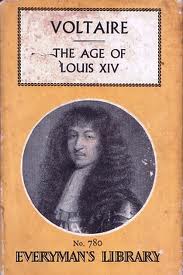
IT is not only the life of Louis XIV. that we propose to write; we have a greater object in view. We mean to set before posterity not only the portrait of one man’s actions but that of the spirit of mankind in general, in the most enlightened of all ages.
Every age has produced heroes and politicians; all nations have experienced revolutions, and all histories are nearly alike to those who seek only to furnish their memories with facts; but whosoever thinks, or, what is still more rare, whosoever has taste, will find but four ages in the history of the world. These four happy ages are those in which the arts were carried to perfection, and which, by serving as the era of the greatness of the human mind, are examples for posterity.
The first of these ages to which true glory is annexed is that of Philip and Alexander, or that of a Pericles, a Demosthenes, an Aristotle, a Plato, an Apelles, a Phidias, and a Praxiteles; and this honor has been confined within the limits of ancient Greece; the rest of the known world was then in a state of barbarism.
The second age is that of Cæsar and Augustus, distinguished by the names of Lucretius, Cicero, Titus, Livius, Virgil, Horace, Ovid, Varro, and Vitruvius.
The third is that which followed the taking of Constantinople by Mahomet II. Then a family of private citizens was seen to do that which the kings of Europe should have undertaken. The Medici invited to Florence the learned, who had been driven out of Greece by the Turks; this was the age of Italy’s glory. The polite arts had already recovered a new life in that country; the Italians honored them with the title of “Vertu,” as the first Greeks had distinguished them by the name of Wisdom. Everything tended toward perfection; a Michelangelo, a Raphael, a Titian, a Tasso, and an Ariosto flourished. The art of engraving was invented; elegant architecture appeared again as admirable as in the most triumphant ages of Rome; and the Gothic barbarism, which had disfigured Europe in every kind of production, was driven from Italy to make way for good taste.
Francis I. encouraged learned men, but such as were merely learned men; he had architects, but he had no Michelangelo, nor Palladio; he endeavored in vain to establish schools for painting; the Italian masters, whom he invited to France, raised no pupils there. Some epigrams and a few loose tales made the whole of our poetry. Rabelais was the only prose writer in vogue in the time of Henry II.
François-Marie Arouet, most famously known as Voltaire, was a universal genius with unspeakable creativity. he produced works in almost every literary form including plays, poetry, novels, essays, and historical and scientific works.

